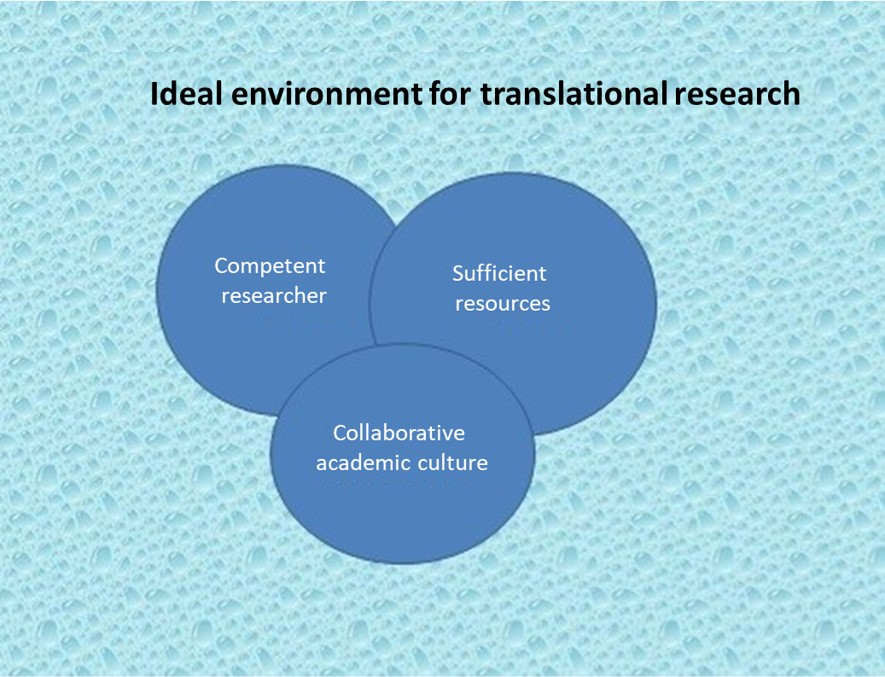| BOARD OF TRANSLATIONAL RESEARCH IN DENTISTRY |
| No |
Name-Surname |
Duty |
| 1 |
Assoc. Prof. Çigdem E. ÇUBUKÇU |
Head |
| 2 |
Prof. A. Alper PAMPU |
Member |
| 3 |
Prof. Bülent BAYDAS |
Member |
|
4
|
Assoc. Prof. Gülçin TEZCAN |
Member |
| 5 |
Assist Prof. Zeynep Ceren ÇELIK |
Member |
Translational Dentistry
What is Translational Research?
Translational Research is a continuum of research where discoveries of basic sciences are used clinically to prevent or treat human diseases. It is an iterative process in which scientific discoveries are integrated into clinical requirements and practices. A translational study also contributes to new basic sciences discoveries according to its impact on clinical science applications.
A translational research process is planned in 3 phases;
- Phase 1: The findings of researches of basic medical sciences are applied to clinical models such as clinically relevant tissue models and cell lines.
- Phase 2: Assessments are performed in the clinics/clinical practice.
- Phase 3: Clinical practice knowledge is used for translation to improve more extensive health care.
Clinical translational research focuses on discovering the basic knowledge gained by systematic basic medical science researches, which is the transformation of laboratory studies into an improved health strategy. It fills the knowledge gaps between basic science researches (laboratory-based inventions) and clinical researches (clinical knowledge) for clinical practice goals and assists in developing strategies to encourage the adoption of best practices in clinical settings, the community, and policy development.
How to Establish a Translational Research Environment in an Institution?
- Recommendation 1: Facilitating the required training and skills to conduct effective translational research,
- Recommendation 2: Establishing a career development program in translation science for mentor research for faculty members,
- Recommendation 3: Establishing a translation research team consisting of clinicians, clinician-scientists, basic scientists, and business managers to deal with data integration and interpretation,
- Recommendation 4: Establishing focused research grants and platforms for regular research seminars,
- Recommendation 5: Establishing collaboration groups with researchers from different research backgrounds and experiences,
- Recommendation 6: Encouraging the community to participate in the institutional research initiative,
- Recommendation 7: Establishing focused research groups based on the needs of the society and the strength of the institution,
- Recommendation 8: Creating databases to connect potential collaborators,
- Recommendation 9: Networking basic and clinical science researchers with similar interests,
- Recommendation 10: Encouraging translational researchers.

Technological advances in dentistry aim to increase clinical efficacy and predictability of treatment. Research that will create a significant paradigm shift in the scientific or therapeutic perspective of the dental sciences is rare. Translational studies play a crucial role in scientific discoveries that will affect clinical dentistry and form the basis of a paradigm shift. For this purpose, Bursa Uludag University Translational Dentistry Research Board was established. The aims of the board; to carry out advanced scientific research on the production of biomedical devices, to maximize university-industry cooperation in the production of high value-added, state-of-the-art medical devices and innovative products in Turkey, to develop high value-added, state-of-the-art medical devices and innovative products by collaborating with researchers working in the fields of health sciences, natural sciences, social sciences, and educational sciences, and to cooperate with industry, institute, R&D laboratories to use their infrastructure to carry out crucial integrated research within pharmacology, biochemistry, molecular biology and genetics, and materials sciences.
